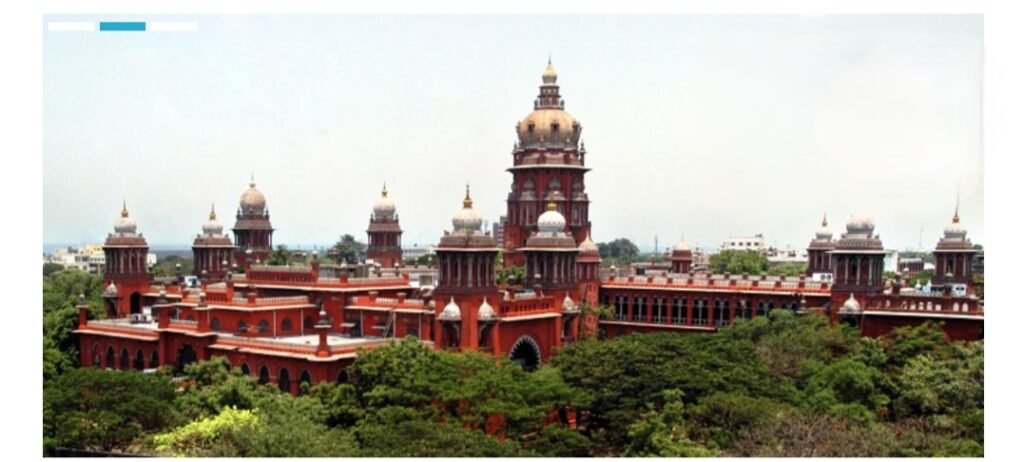In a significant ruling, the High Court of Madras has held that, “Foreign nationals facing trial in India are also entitled to Right to life and dignity under Article 21 of the Constitution of India”.
The right to life and dignity, under Article 21 of the Constitution of India, has established a powerful shield of protection, ensuring that the right to life and dignity extends beyond borders, safeguarding every Indian citizen. By this judgement, the Court has re-emphasized the fundamental right to life with dignity for every human, both Indian nationals and foreign nationals.
Case Overview
The principles of Article 21 of the Constitution of India came into question, in the present case of Karthik Parthiban (supra), wherein the Petitioner was a citizen of Seychelles, East Africa. The Petitioner was confined in India following a Lookout Circular (LOC) issued by the Central Bureau of Investigation (CBI) against him owing to an ongoing criminal investigation in which the petitioner was implicated.
The Writ Petition was filed by the Petitioner under Article 226 of the Constitution of India seeking a Writ of Mandamus. In other words, the Petitioner sought a direction from the court to the relevant public authorities to perform its official duties i.e., a direction to the Respondents to grant the Petitioner permission to travel to Malaysia for a particular period, citing personal family reasons as well as his fundamental rights outlined by the Constitution of India.
Factual Matrix
The Broadcourt Investments Ltd. (Broadcourt), of which the Petitioner was a director at some given point, is alleged to be involved in a financial fraud. Seemingly, in his capacity as Broadcourt’s Director, the Petitioner has played a major role to divert the loan sanctioned by a IDBI Bank in favour of one M/s Axel Sunshine Limited, for facilitating closure of a loan advanced by IDBI Bank to another entity, namely, M/s WinWind Oy, whose account was already declared as a non-performing asset by the bank. This fraudulent act has ostensibly caused a significant loss of Rs. 600 crores to IDBI Bank.
The Petitioner is a citizen of Seychelles and was employed in Singapore for a year prior to being implicated in the alleged financial fraud. CBI has issued an LOC on account of the alleged involvement of the Petitioner in the said fraud.
Citing humanitarian difficulties and the dire situation faced by the Petitioner’s parents residing in Malaysia, the Petitioner sought permission to travel to Malaysia for a certain period. Pertinently, the Petitioner was earlier allowed by the Court to travel abroad for a limited time by suspending the LOC on certain conditions which were complied with by the Petitioner.
Arguments Advanced
The Petitioner placed reliance on the landmark ruling in Maneka Gandhi v. Union of India, which recognized the right to travel abroad as part of the fundamental rights guaranteed under Articles 19 and 21 of the Constitution. He argued that, even though he is a citizen of Seychellois, he is entitled to the right to dignified life and the freedom to travel abroad.
The Petition was objected by the prosecution, on the basis that Indian citizens are undoubtedly entitled to the rights enshrined under Article 21 of the Constitution of India however, outlanders involved in a financial crime cannot be entitled to the rights under Article 21.
The Prosecution apprehended that the Petitioner may not return to India in an attempt to avoid the investigation and trial of the alleged financial crime. This apprehension was more so since, the Petitioner is a foreign national, i.e., citizen of Seychelles, and there is no extradition treaty between India and Seychelles.
Findings
While acknowledging CBI’s apprehension that the petitioner may use this as an opportunity to flee the country, the Court held that to while ensuring smooth trial of an offence, an individual’s life and freedom, be it a national or not, cannot be compromised. The court reiterated the principle laid down in the case of Sunil Batra v. Delhi Administration, that, even a convicted individual holds a right to a dignified life, which Article 21 of the Constitution recognises as inhering in every human being including foreigners.
The Court maintained that, if Article 21 applies to non-citizens, then right to personal life of any foreign national facing a criminal charge in India must also be recognised as falling within his right to dignified existence. The Court relied upon K.S. Puttaswamy v. Union of India to hold that “Anything personal is part of one’s privacy and unless it is enabled by law, it cannot be invaded, even if the accused person is a foreign national”.
Conclusion
The Madras High Court’s ruling in the case of Karthik Parthiban (supra), reflects a careful balance of individual rights and the state’s interests. By this holding, the Court has re-emphasized that foreign nationals, whether involved in legal proceedings or detention are entitled to the same dignity and right to life as Indian citizens.
The Indian judiciary has, time and again, extended constitutional guarantee to foreign nationals facing trial within India, and upheld the principles of fairness, justice, equity and legal safeguards for all individuals irrespective of their nationality. The courts have consistently emphasized that the protections enshrined in Article 21 are universal, reinforcing India’s unwavering commitment to human rights and the rule of law. This legal framework and the commitment of the courts not only reflects India’s constitutional ethos but also positions it as a guardian of justice for all who seek or find themselves within its jurisdiction.
Authors: Shalvika Nachankar, Aditya Ojha & Mihika Joshi

